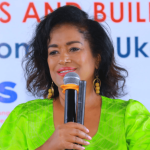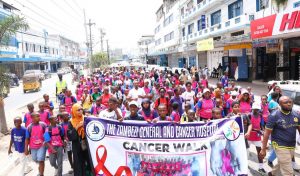As the country continues to grapple with the cancer scourge, Coastal region county governments have been urged to intensify awareness campaigns to promote early screening and treatment.
People of all ages braved Mombasa’s early morning scorching sun that fiercely blazed from the sky with its rays pouring down like molten spears, searing the earth and shimmering off the parched ground to walk for ten kilometres to raise awareness of cancer and other non-communicable diseases.
The walk was organised by Zambezi Hospital in collaboration with Al-Zak Medical Clinic and BF Suma began at the Holy Ghost Cathedral. Organisers used the walk to encourage residents to go for an early screening for cancer for better management and treatment of the scourge.
Maina Mbugua, organiser of the walk, said the ongoing research shows the food that people consume significantly contributes to cancers.
“We decided to incorporate children to take early precautions before the situation worsens. Most of the foods they consume in schools have led to their obesity and cancer thriving well with obesity and people with low immune systems,” said Mbugua.
The Kenya Demographic and Health Survey, 2022, shows that only 16 per cent of women aged 15-49 were examined by a healthcare worker for breast and cervical cancers, respectively.
Mwinyi Mzee, a Clinical Oncologist, said cancer can be reversed successfully when in stage one or two.
He advised Kenyans to avoid the use of single-use plastics in refrigerators, as they can cause cancer.
“When the plastic starts to disintegrate or change to yellowish, it means nitrates penetrate it. Most of us fry our meals; cooking oil is supposed to be used only twice but due to economic challenges we recycle the oils, ending up getting carcinogenic nitrates,” said Mzee.
Kenyans were encouraged to embrace physical exercises, drink lots of water and eat a healthy diet to reduce the risk of cancer.
“Green vegetables and fruits are important. Experts say we are supposed to eat fruits with green vegetables five times a day to improve the immune system,” stated Mzee.
“Vitamin D, when given in high doses, can reverse cancer in early stages. You should not wait for it. In the early morning sun, you will be able to get 20,000 International Units of Vitamin D, which are crucial to your body,” he added.
The Clinical Oncologist also encouraged Kenyans to eat traditional meals and ignore myths and misconceptions about cancer.
Coast Development Authority (CDA) Chairman Mzee Mwinyi said Mombasa has the highest cancer rate in the region, with breast and cervical cancers leading in women and prostate in men.
“Kilifi County has reported high cases of esophageal cancer, which is attributed to dietary habits. Kwale County has seen a rise in cervical cancer partly due to low screening rates and high Human Papillomavirus (HPV) prevalence,” divulged the CDA Chairman.
He noted that many people in rural areas lack access to cancer screening and treatment facilities. He urged Coastal counties to invest in prevention and awareness campaigns.
“We want more investments in health from our County Governments,” he said, promising through the CDA to augment the devolved government efforts in resource mobilisation for hospital developments.
He reiterated the Authority’s commitment to promoting public health campaigns that focus on prevention and early detection.
On his part, Chairman of the Board of Directors of the Lamu Port-South Sudan-Ethiopia Transport (LAPSSET) Corridor Development Authority (LCDA) Ali Mbogo urged Mombasa to devolve cancer screening from the dispensary level to decongest the Coast General Teaching and Referral Hospital.
“It’s high time we start to equip our hospitals. Prevention is better than cure. If we start to adopt preventive medicine, we will avoid many things,” he said, calling for more awareness on screening akin to HIV/AIDS testing.
By Sadik Hassan









